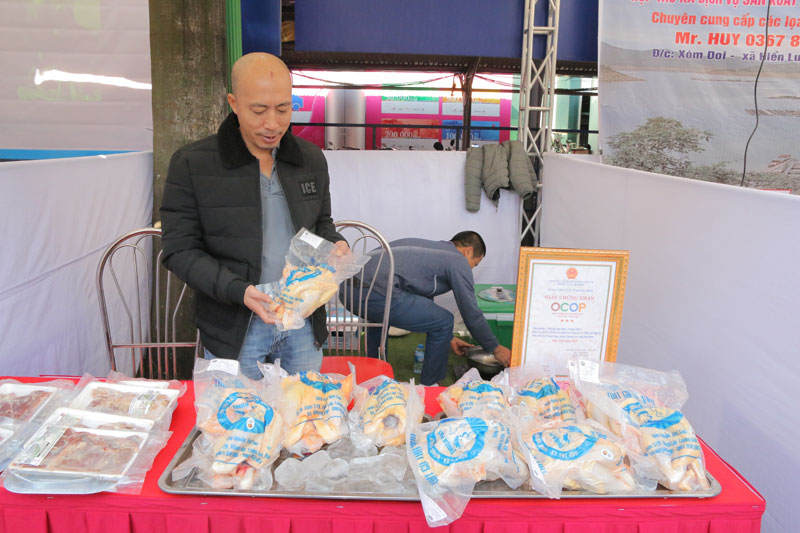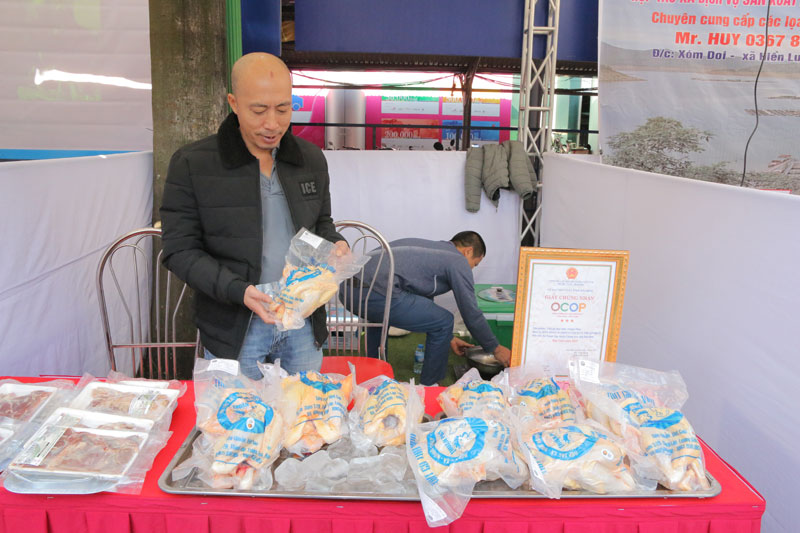
(HBO0 - Gardening chicken in Thanh Lap commune, Luong Son district are derived from Son Tay chicken. Up to now, Thanh Lap gardening chicken brand is well known by many consumers thanks to Thuan Phat Agricultural and Service Cooperative developing chicken brand in the link chain, increasing value for farmers.

Thuan Phat gardening chicken products are rated 3-star OCOP products at the provincial level, stable consumption market, generating income for farmers.
Thanh Lap commune is suitable for the development of chicken farming. Chicken is more delicious. This is one of the characteristics that make up the chicken brand in Thanh Lap commune. Chickens in Thanh Lap commune have small body, low legs, small nails, yellow or white skin. The hen has yellowish-brown or light brown fur, yellow legs, small heads, dark spots on the neck, wing tips and tail, single crest.
Breeding gardening chicken in Thanh Lap is easy to raise, suitable for grazing, has high resistance so it can withstand good nutritious food conditions.
In order to help Thanh Lap's gardening chicken brands become more competitive than other types of poultry, Thuan Phat Agricultural and Service Cooperatives implement a linkage model along the value chain, selling breeds and animal feed to satellite households, and support product consumption with nearly 20 households in village 3/2 B participating in the link chain.
Currently, broiler products of vacuum-packing cooperatives are present at 15 safety food stores in Hanoi, stable output. The output of cooperatives is 40 tons of finished products per year, for sales of over 6 billion per year. Vacuum chicken gardening bag of agricultural cooperatives and services Thuan Phat is rated 3-star OCOP provincial level in 2019, opening opportunities for products with more stable consumption, introducing products to consumers inside and outside the province.
According to data from the Hoa Binh Provincial Party Committee, the industrial production index for the first six months of 2025 is estimated to have increased by 20% compared to the same period last year. This marks the highest year-on-year growth rate for this period since 2020.
In the first six months of 2025, Hoa Binh province’s export turnover was estimated at 1.145 billion USD, marking an 18.11% increase compared to the same period in 2024. Import turnover was estimated at $ 804 million, a 17.15% increase, which helped the province maintain a positive trade balance.
The lives of the ethnic minority farmers in Tan Lac district have gradually improved thanks to the new directions in agricultural production. This is a testament to the collective strength fostered through the professional associations and groups implemented by various levels of the district’s Farmers’ Union.
With the motto the "product quality comes first,” after nearly one year of establishment and operation, Muong village’s Clean Food Agricultural and Commercial Cooperative, located in Cau Hamlet, Hung Son Commune (Kim Boi district), has launched reputable, high-quality agricultural products to the market that are well-received by consumers. The products such as Muong village’s pork sausage, salt-cured chicken, and salt-cured pork hocks have gradually carved out a place in the market and they are on the path to obtaining the OCOP certification.
In the past, the phrase "bumper harvest, rock-bottom prices" was a familiar refrain for Vietnamese farmers engaged in fragmented, small-scale agriculture. But today, a new spirit is emerging across rural areas of Hoa Binh province - one of collaboration, organisation, and collective economic models that provide a stable foundation for production.
Maintaining growing area codes and packing facility codes in accordance with regulations is a mandatory requirement for agricultural products to be eligible for export. Recently, the Department of Agriculture and Environment of Hoa Binh province has intensified technical supervision of designated farming areas and packing facilities to safeguard the "green passport" that enables its products to access international markets.



